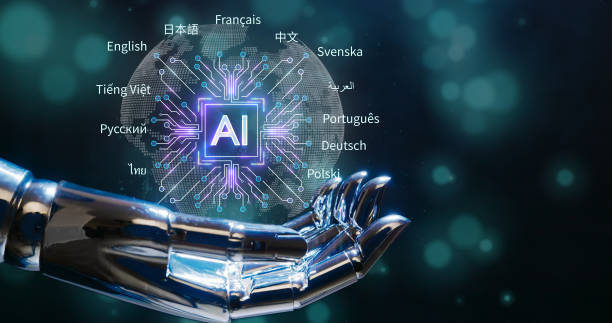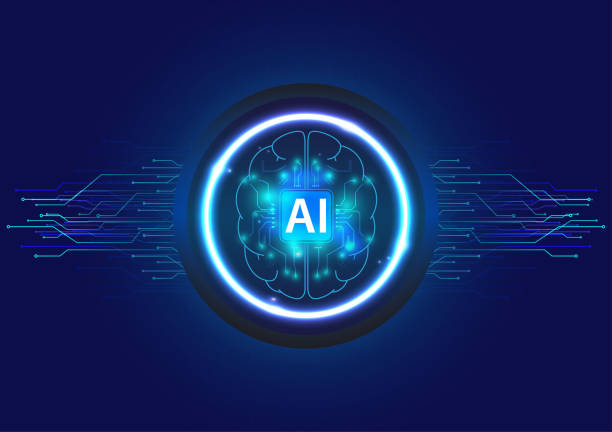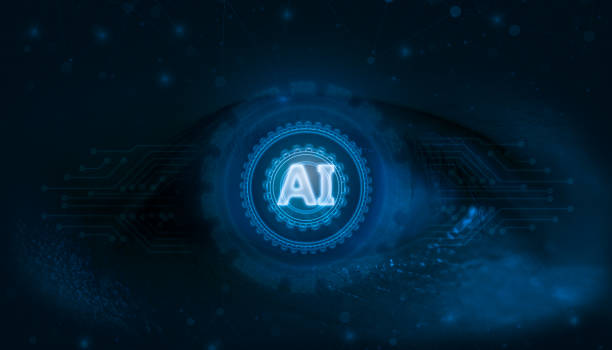What is Artificial Intelligence and How Does it Work?
#Artificial_Intelligence is a branch of computer science that seeks to build machines that can perform tasks that usually require human intelligence.
These tasks include learning, problem-solving, decision-making, understanding natural language, and pattern recognition.
Artificial intelligence operates through complex algorithms and mathematical models that allow machines to learn from data and make predictions or decisions based on it.
These algorithms can be designed manually or allow machines to learn them themselves through processes such as machine learning.
In fact, artificial intelligence is an effort to simulate human cognitive processes in machines, so that they can perform tasks that humans are capable of doing, automatically and with high efficiency.
The applications of artificial intelligence are very wide and are used in fields such as medicine, engineering, economics, and many other industries.
Artificial intelligence is trying to create abilities such as reasoning, planning, learning, and language comprehension in machines.
With the advancement of technology, artificial intelligence is increasingly penetrating our daily lives and has profound effects on societies and economies.
Did you know that a poorly designed online store can drive away up to 70% of your potential customers? Rasaoab revolutionizes your sales by designing professional and user-friendly online stores.
✅ Significant increase in sales and revenue
✅ Complete optimization for search engines and mobile
⚡ [Get Free Consultation from Rasaoab]
Types of Artificial Intelligence: Classification and Review
Artificial intelligence can be divided into several categories based on its capabilities and applications.
One of the most common classifications is dividing it into Narrow AI, General AI, and Super AI.
Narrow AI, which is the most common type today, is designed to perform specific tasks and performs very well in the same domain.
For example, facial recognition systems or movie recommendation systems are examples of Narrow AI.
General AI, which is still in the development stages, refers to a machine that can perform any intellectual task that a human is capable of performing.
Super AI, which is currently a hypothetical concept, refers to an intelligence that surpasses human intelligence and can solve more complex problems.
Another classification is based on the learning method, which includes supervised learning, unsupervised learning, and reinforcement learning.
In supervised learning, the machine is trained using labeled data, while in unsupervised learning, the machine extracts patterns from unlabeled data.
Reinforcement learning is a method in which the machine learns how to perform a task in the best way through interaction with the environment and receiving rewards or penalties.
Each of these methods and types of artificial intelligence has its own specific applications and is used according to different needs.
As a result, understanding the different types of artificial intelligence and their applications can help us to use this technology in the best way and prepare for a future in which artificial intelligence plays an important role.
Widespread Applications of Artificial Intelligence in Everyday Life
Artificial intelligence is present in many aspects of our daily lives today and has had significant impacts on them.
Some of the common applications include: In the field of medicine, artificial intelligence helps in diagnosing diseases, analyzing medical images, and developing new drugs.
In the automotive industry, self-driving cars are able to recognize their surroundings and drive without human intervention using artificial intelligence.
In the financial sector, artificial intelligence is used to detect fraud, manage risk, and provide financial advice.
Also, in marketing, artificial intelligence helps companies better understand customer behavior and provide more targeted advertising.
In addition, artificial intelligence plays an important role in the field of education and can help provide personalized training and improve the learning process.
In smart homes, artificial intelligence helps control devices, manage energy, and increase security.
In general, the applications of artificial intelligence are very wide and are increasing day by day with the advancement of technology.
This technology is able to improve our lives in many aspects and help us do our work more efficiently.
Here is a table of the applications of artificial intelligence in different industries:
| Industry | Applications |
|---|---|
| Medicine | Disease diagnosis, analysis of medical images, drug development |
| Automotive | Self-driving cars, driver assistance systems |
| Finance | Fraud detection, risk management, financial advice |
| Marketing | Customer behavior analysis, targeted advertising |
Click here to preview your posts with PRO themes ››
And here is a table of artificial intelligence techniques and their applications:
| Technique | Applications |
|---|---|
| Machine Learning | Prediction, classification, clustering |
| Neural Networks | Image recognition, natural language processing |
| Natural Language Processing | Machine translation, sentiment analysis |
| Expert Systems | Specialized advice, problem-solving |
Advantages and Disadvantages of Using Artificial Intelligence
The use of artificial intelligence has many advantages.
Among the most important of these are increased efficiency, reduced errors, and improved decision-making.
Artificial intelligence can perform tasks that are tedious or difficult for humans quickly and accurately.
This technology can also analyze large volumes of data and identify patterns that humans are unable to see.
This can help improve decision-making in various fields.
However, the use of artificial intelligence also has disadvantages.
One of the most important challenges is the ethical concerns related to privacy and data security.
Also, artificial intelligence can lead to job losses, as machines are able to perform many of the tasks that were previously performed by humans.
In addition, over-reliance on artificial intelligence can lead to a decline in human skills and increased vulnerability to cyberattacks.
As a result, the use of artificial intelligence should be done carefully and considering its advantages and disadvantages.
Are you unhappy with the low conversion rate of visitors to customers on your online store?
Solve this problem forever with professional online store design by Rasaoab!
✅ Increase the conversion rate of visitors to customers
✅ Create a great user experience and build customer trust
⚡ Get a Free Consultation
What Does the Future Hold for Artificial Intelligence?
The future of artificial intelligence is very bright and full of possibilities.
It is predicted that this technology will increasingly penetrate our lives in the coming years and have profound effects on societies and economies.
In the future, we will see the development of general artificial intelligence that will be able to perform any intellectual task that a human is capable of performing.
This can lead to major transformations in various fields.
Also, artificial intelligence is expected to increasingly integrate with other technologies such as the Internet of Things (IoT), Blockchain and cloud computing, creating new possibilities.
This integration can lead to the development of intelligent and automated systems that are able to solve complex problems and improve our quality of life.
However, the future of artificial intelligence also brings challenges that need to be addressed.
These challenges include ethical concerns, security issues, and social and economic impacts.
As a result, to benefit from the advantages of artificial intelligence and reduce its risks, we must actively participate in the development and use of this technology and ensure that it is used responsibly and with regard to the public interest.
Machine Learning: An Important Subset of Artificial Intelligence
Machine Learning is a vital and dynamic subset of artificial intelligence that allows machines to learn from data and improve their performance without explicit programming.
This process is done through algorithms that identify patterns and relationships in the data and use them to make predictions or decisions.
Machine learning is widely used in various fields including image recognition, natural language processing, recommenders, and data analysis.
There are different types of machine learning algorithms, including supervised learning, unsupervised learning, and reinforcement learning.
Each of these methods is suitable for solving specific problems and allows machines to acquire new knowledge using data and improve their performance over time.
Machine learning plays a very important role in the development of artificial intelligence and allows machines to perform tasks that were previously difficult or impossible for humans.
Artificial intelligence and machine learning are two related concepts that are often used interchangeably, but in reality, machine learning is one of the main methods for achieving the goals of artificial intelligence.
Natural Language Processing (NLP) and Its Role in Artificial Intelligence
Natural Language Processing (NLP) is a branch of artificial intelligence that allows machines to understand and produce human language.
This technology is used to analyze, interpret, and generate text and speech and plays a very important role in the development of intelligent systems that communicate with humans in a natural way.
NLP is used in various applications including machine translation, sentiment analysis, question answering, and text generation.
Click here to preview your posts with PRO themes ››
Some of the common techniques in NLP include syntactic parsing, semantic analysis, and named entity recognition.
These techniques allow machines to understand the structure and meaning of sentences and extract useful information from texts.
With the advancement of technology, NLP is increasingly penetrating our daily lives and has profound effects on societies and economies.
For example, voice assistant systems such as Siri and Alexa use NLP to understand users’ voice commands and respond to them.
NLP is one of the most important research areas in artificial intelligence and is expected to see major advances in this area in the coming years.
Ethical Challenges of Artificial Intelligence and Solutions to Deal with Them
Artificial intelligence, despite its many advantages, also brings many ethical challenges.
One of the most important of these challenges is the issue of discrimination.
If the data used to train artificial intelligence systems is biased, these systems can also act discriminatorily and make unfair decisions.
Another challenge is the issue of privacy.
Artificial intelligence systems can collect and analyze large amounts of personal data, which can lead to violations of people’s privacy.
Also, the issue of accountability is one of the important challenges.
If an artificial intelligence system makes a wrong decision and causes damage, it is difficult to determine responsibility.
To address these ethical challenges, it is necessary to develop strict ethical regulations and standards for the development and use of artificial intelligence.
Also, efforts should be made to ensure that the data used to train artificial intelligence systems is free of discrimination.
In addition, it must be ensured that people’s privacy is protected when using artificial intelligence systems.
Finally, accountability mechanisms should be considered so that responsibility can be determined in the event of an error.
Artificial intelligence, artificial intelligence, artificial intelligence, artificial intelligence, artificial intelligence, artificial intelligence, artificial intelligence, artificial intelligence, artificial intelligence
Do you dream of a thriving online store but don’t know where to start?
Rasaoab is your comprehensive online store design solution.
✅ Attractive and user-friendly design
✅ Increase sales and revenue⚡ Get a Free Consultation
The Impact of Artificial Intelligence on the Labor Market and Future Jobs
Artificial intelligence will have significant impacts on the labor market and future jobs.
On the one hand, artificial intelligence can lead to the loss of some jobs, as machines are able to perform many of the tasks that were previously performed by humans.
This is especially true for jobs that are repetitive and routine.
On the other hand, artificial intelligence can also lead to the creation of new jobs.
The development, implementation, and maintenance of artificial intelligence systems require new specialists who are specialized in areas such as machine learning, natural language processing, and data science.
In addition, artificial intelligence can lead to a change in the nature of many jobs.
In the future, humans will act more as supervisors and coordinators of machine activities, and their role in more complex and creative decision-making will increase.
To prepare for these changes, people need to learn new skills and adapt to new technologies.
Also, governments and organizations should adopt policies that help people find new jobs and acquire the skills needed for the future.
AI-related jobs are increasing and people need to prepare for this change.
How to Learn Artificial Intelligence: Educational Resources and Paths
Learning artificial intelligence can be a challenging but very rewarding process.
To get started, you can use online educational resources such as training courses, books, and articles.
Many universities and educational institutions offer online courses in artificial intelligence, which can be a great starting point.
You can also use educational books and scientific articles to learn the basic concepts of artificial intelligence and machine learning.
In addition to online resources, you can participate in workshops and conferences related to artificial intelligence.
These events are a good opportunity to learn from experts and connect with other artificial intelligence enthusiasts.
Also, you can use the experiences of others and ask your questions by joining online communities and specialized forums.
To learn the practical side of artificial intelligence, you can define personal projects and implement simple intelligent systems using the existing tools and libraries.
This will help you understand the theoretical concepts in a practical way and improve your skills.
With effort and perseverance, you can specialize in the field of artificial intelligence and play an important role in this thriving and growing industry.
Click here to preview your posts with PRO themes ››
Frequently Asked Questions
| Question | Answer |
|---|---|
| 1. What is Artificial Intelligence (AI)? | It is a branch of computer science that aims to create machines capable of simulating human intelligence and performing tasks that require human thinking, such as learning, problem-solving, and decision-making. |
| 2. What are the main types of artificial intelligence? | It can be classified into Weak AI (Narrow AI) that focuses on a specific task, General AI that possesses comprehensive human capabilities, and Super AI that surpasses human intelligence. |
| 3. Mention some common artificial intelligence applications in our daily lives. | These include voice assistants (such as Siri and Alexa), recommendation systems (such as Netflix and Amazon), self-driving cars, facial recognition systems, and spam filters. |
| 4. What is the difference between Artificial Intelligence and Machine Learning? | Artificial intelligence is the broader concept of creating intelligent machines, while machine learning is a subset of artificial intelligence that focuses on enabling systems to learn from data without explicit programming. |
| 5. What is Deep Learning? | It is a subset of machine learning that uses multi-layered artificial neural networks (deep neural networks) to process data and discover complex patterns, and is used in image and speech recognition. |
| 6. What are the most prominent benefits of artificial intelligence? | Improving efficiency and productivity, automating repetitive tasks, making better decisions based on the analysis of large data, and developing solutions to complex problems in fields such as medicine and science. |
| 7. What are the main challenges facing the development and deployment of artificial intelligence? | These include the need for massive amounts of high-quality data, privacy and security issues, bias in data and algorithms, and high development and maintenance costs. |
| 8. Does artificial intelligence raise ethical or social concerns? | Yes, it raises concerns related to privacy, algorithmic bias, job losses due to automation, responsibility for errors made by intelligent systems, and the need for a regulatory framework. |
| 9. How can artificial intelligence affect the future of the labor market? | It can lead to the automation of some routine jobs, but it will also create new jobs that require advanced skills in developing, operating, and maintaining artificial intelligence systems. |
| 10. What are some modern or promising technologies in the field of artificial intelligence? | These include advanced Natural Language Processing (NLP) (such as large language models like ChatGPT), Computer Vision, Robotics, and Generative AI. |
And other services of Rasa Web Advertising Agency in the field of advertising
Intelligent Social Media: Transform online growth with the help of user experience customization.
Intelligent Digital Branding: A combination of creativity and technology for online growth through attractive user interface design.
Intelligent Direct Marketing: A new service to increase digital branding by optimizing key pages.
Intelligent Website Development: A new service to increase sales through marketing automation.
Intelligent Advertising Campaign: A creative platform to improve campaign management using real data.
And over a hundred other services in the field of internet advertising, advertising consulting, and organizational solutions
Internet Advertising | Advertising Strategy | Advertorial
Resources
Principles of Artificial Intelligence: A Comprehensive Guide to Understanding AI
,What is Artificial Intelligence and What are its Applications?
,What is Artificial Intelligence (AI)? – In Simple Terms + Applications and Branches
,What is Artificial Intelligence? Everything About Artificial Intelligence
? Are you ready to transform your business in the digital world? Rasaoab Digital Marketing Agency, with expertise in responsive website design, SEO, and online campaign management, is your comprehensive solution for growth and visibility. Contact us today for consultation and to take big steps on the path to success.
📍 Tehran, Mirdamad Street, next to the Central Bank, South Kazerun Alley, Ramin Alley No. 6















